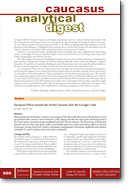Informal Networks in the South Caucasuss Societies

Author(s): Huseyn Aliyev
Editor(s): Jeronim Perovic, Lili Di Puppo, Iris Kempe, Heiko Pleines, Matthias Neumann, Robert Orttung
Series: Caucasus Analytical Digest (CAD)
Issue: 50
Pages: 2-4
Publisher(s): Center for Security Studies (CSS), ETH Zurich; Research Centre for East European Studies, University of Bremen; Institute for European, Russian and Eurasian Studies, George Washington University
Publication Year: 2013
